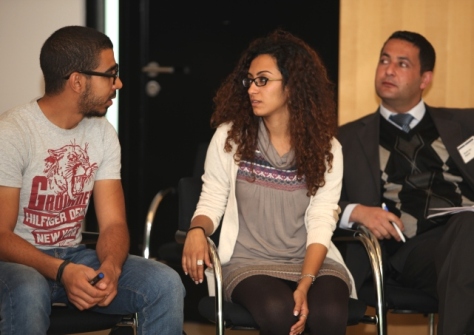"The Social Media and their Role in Politics and Society"
חומר מאירועים

The opportunities offered by Facebook and Twitter were widely used to bring down regimes during the Arab Spring. One workshop discussed the future role of social media and its pros and cons.
Sharing thoughts on everyday life, posting holiday pictures, and looking for a date – those were the activities people used to associate with social media the most. Then, the Arab Spring suddenly changed the world, and taught us that thoughts on corrupt regimes, pictures from Tahrir Square, and the location of the next demonstration in Tunis can also be shared via Twitter, Facebook and other communication platforms on the internet. The revolutions in the Middle East were not the first to use social media and the advantages of web 2.0 as political means. Barack Obama benefited from an unequaled internet campaign in 2008, and in Iran 2009, the revolt spread through the net after the disputed presidential election. Nevertheless, the Arab Spring brought social media to a new level of perception. Consequently, one of the workshops during the European-Arab Youth Congress addressed the question of "The Social Media and their Role in Politics and Society".
Matching the international nature of social media, the opening discussion panel consisted of a Tunisian blogger (Aymen Talbi), a German political scientist with Egyptian roots (Dr. Asiem El Difraoui), a social media expert of the German Christian Democratic Party CDU (Dr. Stefan Hennewig), and a Belorussian journalist and dissident (Iryna Vidanava). The latter showed that authoritarian regimes share many similarities, no matter whether they rule in Eastern Europe or the Middle East. "We never felt so close to them", Vidaneva said about the Arab Spring and its connection to the freedom movement in Belarus through social media. "Dictators learn from each other," she concluded. "So we have to be linked to each other to be quicker than them."
The discussion during the workshop showed that social media offer similar opportunities everywhere in the world - and raise similar concerns, too. Participants from many different countries, for instance Syria, the Netherlands, or Bosnia, agreed that a 'one-click-culture' on the internet could in some people's minds replace real activism on the street by pressing a 'like'-button and going back to business as usual. The participants from countries still struggling for democracy and freedom of the press unanimously emphasized that in their societies, the credibility of internet media is much higher than that of classic media. Today, news is spread through social media, and large parts of the population can access and use them. Therefore, social media have changed the political process. Discontented parts of the society can easily find out that they are not alone and express themselves.
El Difraoui pointed out, however, that social media are neither good nor bad in themselves, but can be used as a tool to either empower people or control them. "It will be a daily fight to defend the freedom of internet," he stated. The web 2.0 can only provide people with a set of helpful tools. "No social media make revolutions, people make revolutions," he underlined. Vidaneva added that criticism can be dangerous in police states even if it is expressed only in social networks. "When you create something on Facebook, you have to keep in mind that you're responsible for those kids who 'like' it and do not know that they might end up in prison," she emphasized.
The participants brought together a broad range of experience in different fields of internet activism and political work. In fruitful discussions, several aspects of social media were merged into the following five concluding statements: Social media enable every internet user to freely access, produce, and share information with large numbers of people across borders. It makes power disseminate into society. Social media do not provide information with high reliability and do not show high objectivity. They require critical thinking and shift the responsibility to the user. Most social media tools are owned by private companies and therefore can be subject to commercial interest. Social media can enhance pluralism by overcoming time, space, and borders. There is a trade-off between online exposure and privacy which may result in safety concerns.
נושאים
על סדרה זו
קרן קונרד אדנאואר, מפעלי ההשכלה שלה, מרכזי הלימוד, וסניפיה בחו"ל, מארגנים אלפי אירועים בשנה בנושאים שונים. כולל: ועידות , אירועים מיוחדים, וסימפוזיונים. רק באתרינו www.kas.de תמצאו דיווחים שוטפים על אירועים נבחרים שהוכנו במיוחד עבורכם.
מלבד סיכומים תמצאו באתר גם חומר נוסף כגון:
תמונות, תמלילי נאומים, הקלטות קוליות והקלטות וידאו.


